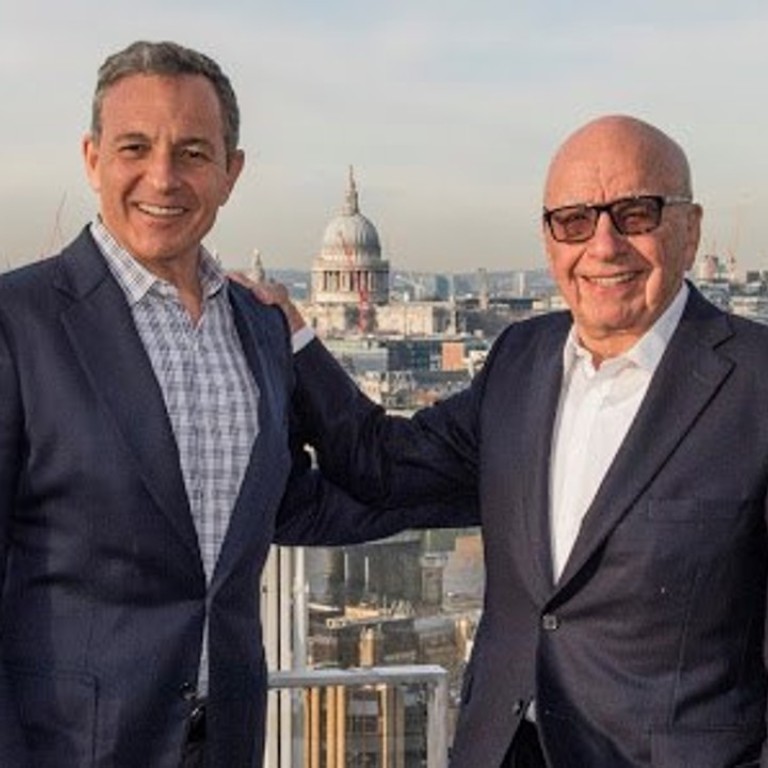
How Rupert Murdoch solved his Don Corleone dilemma with a masterpiece of deal making
Selling his media assets to Disney has minimised the News Corp chief’s succession risks and given him a position of flexibility
The essence of smart business is being a crafty trader at the right time.
Great deal makers know when to turn from buyer to seller, switching from offence to defence. Only Rupert Murdoch, the founder and patriarch, could have decisively executed News Corp’s sweeping US$66 billion deal with Disney.
His decision is motivated by many factors, but it does say a lot about the pervasive and collective disintermediating influence in the media sector. Silicon Valley giants such as Amazon, Google, Facebook and Netflix have devoured viewership and readership at an alarming rate, from right under the corporate aegis of big, traditional media companies such as television networks and newspaper publishers.
A US asset manager and former News Corp director told me that Murdoch had one of the sharpest minds for the strategic value of his media properties versus other competitors.
While he tended to overpay for targets, he usually succeeded. He was a skilled acquirer, demonstrating determination and patience like he did with his long pursuit of Time Warner until he decided to end it in 2014.
When companies like Google or Facebook, started by graduate students or a college dropout, can stage a life-threatening challenge, then even the media tycoons must reorganise and become defensive.
The imagination and audacity of media has shifted to the upstarts and big tech companies who seek fresh models to disintermediate the elderly newspaper titans and old business models.
Remember the old media world? It helps if you think of journalists as dim-witted opportunists, afflicted with a mediocre education and worse manners. Publishers have to treat them with mild disdain to stay on top of them. News Corp. was owner of the South China Morning Post until selling it in 1993.
In the past, all the value in media accrued to the publisher, while hapless journalists toiled and whined about low wages. Few realised that your only hope to make money was to build your own media asset.
Then, the internet and streaming video exploded, and all value was almost immediately diverted from the publisher to the aggregator. That Google and Facebook control over 70 per cent of new online advertising worldwide, while not paying for content, is one of the great revolutions of publishing history; right up there with the invention of the printing press.
The old media titans tried to claw back, but technology was too powerful and popular with consumers. Murdoch even bought MySpace in a desperate rearguard action, but it was too late to turn away Facebook.
Some pundits think Murdoch’s family situation is akin to King Lear. I think it is more like Don Corleone’s dilemma in The Godfather.
The godfather knows he must plan for succession in a turbulent world. Each of his adult children possesses one of his key character traits – wisdom, ruthlessness, kindness and guile, but none of them combine all of them – necessary to survive and succeed in a treacherous world.
Murdoch tried to ignore all the historical evidence that the only thing that can be passed down between generations is wealth and power, not intelligence or ability. Or the “street” or worldly smarts that the founder has accrued over decades of wins and losses. The usurpers of media are radicals who would have never been hired or funded by a major media conglomerate.
So the smart way to minimise succession risks is to do a deal with a non-family owned, professionally run corporation, while leaving open the future opportunity for Murdoch family management. It requires adroit and masterful deal making skills.
The battle over whether content or distribution is king has been heightened. The major studios are reorganising themselves in ways they would have never countenanced years ago. A new generation of viewers consume differently and through mobile devices. The News-Disney deal for Murdoch’s 21st Century Fox assets should consolidate content production and control, while studios try to regain control of distribution.
Consummate deal making leaves you in a position of maximum flexibility. Murdoch has sold his entertainment assets, kept his prized news business. He has achieved exit liquidity if his children don’t seek to ascend at Disney. His 5 per cent stake makes him the largest individual shareholder in Disney, bigger than Apple founder Steve Jobs’ family.
But then history has shown that Murdoch is never totally happy sitting on the sidelines.
Peter Guy is a financial writer and former international banker

